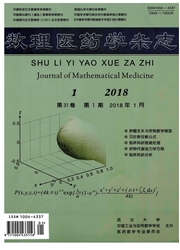

 中文摘要:
中文摘要:
目的:了解广州市某区慢性病患者中社区卫生服务(CHS)利用情况及其影响因素。方法:采用多阶段分层抽样方法,利用固定效应和多水平logistic回归模型分析影响因素。结果:慢性病患者对CHS的利用率为63.05%,主要为看病和开药,慢性病随访仅为9.89%。慢性病患者的CHS利用率在一定程度上具有家庭聚集性或相关性,其影响因素主要有贫困户与否、文化程度、调查前一年住院、听社区讲座、健康知识得分。结论:多水平模型适用于层次结构数据。CHS机构应该针对不同人群的不同行为特点开展宣教活动,从而提高居民对CHS机构的利用率。
 英文摘要:
英文摘要:
Objective:To understand the utilization of community health service(CHS) and its influential factors in patients with chronic disease in Guangzhou.Methods:The household surveys were conducted by multi-stage stratified sampling,the influential factors were screened by fixed-effect logistic model and multilevel logistic regression.Results:The rate of utilization was 63.05% and the most utilized services were patient care and drug purchase,chronic disease follow-up only 9.89%.To some degree the utilization of CHS in patients with chronic disease has family clustering,the major influential factors were whether poor households,educational backgrounds,the hospitalization before survey year,community lectures and health knowledge score.Conclusion:The multilevel model is suitable for multilevel data.The CHS agencies should carry out propaganda and education to improve the utilization of CHS based on the different behavior characteristics of different people.[Author's address] Department of statistics,Institute of Public Health,Guangdong Pharmaceutical University.Guangzhou.
 同期刊论文项目
同期刊论文项目
 同项目期刊论文
同项目期刊论文
 期刊信息
期刊信息
